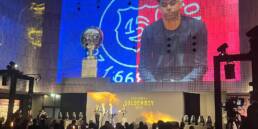by Zdravko Reić
SPLIT – The Golden Boy is one of the most fascinating international football awards, and in general, sports awards of the last twenty years. It’s an extraordinary project. A kind of counterpart to the Ballon d’Or, with the distinction of being reserved for the best Under 21 player. Established under the direction of Tuttosport, based on the idea of Massimo Franchi, the “greatest” connoisseur of global football (and I’m not the only one who thinks so, as I am the dean among the 50 European journalists who have the honor and responsibility to vote each year for the Golden Boy Award).
ALWAYS NEW FACES
Among the many beautiful things that this coveted recognition brings, one is the fact that every autumn the winner is consistently different from the previous ones. A new face always emerges, projecting themselves permanently onto the football scene. It’s logical because once the trophy is won based on their “giant-like” performances, it is normal to enter a new universal dimension. The Golden Boy also represents a formidable springboard for the present and, above all, the future. It cannot be denied that football fans appreciate the 10 consecutive Ballon d’Or awards won between 2008 and 2017 by Messi and Cristiano Ronaldo – true “aliens,” almost supernatural beings – but certainly, the “suspense” was reduced to a minimum: either one would win, or the other. Until our dear Zadar native Luka Modrić, already 33 years old, appeared on the horizon and rose to golden status, finally breaking the powerful duopoly that had even become “tedious” with its repetitive bitonal sound for those who were called to vote and those who hoped, in vain, for a surprise.
YOUTH ACADEMIES IN ZAGREB AND SPLIT
Here in Croatia, the campaign for the Golden Boy is followed with great interest, starting with the players themselves. However, we are aware of how difficult it is for our “Vatreni” (literally “the Fiery Ones”) to reach the top positions of the trophy awarded by Tuttosport. In twenty years of the Golden Boy, no Croatian Under 21 talent has ever even reached the lowest step of the podium. It is challenging for them to be in the spotlight of the European scene because the two most well-known teams, Dinamo and Hajduk (real talent factories), cannot achieve significant results in the Champions League or the second-tier Europa League. Only when they become part of the ranks of the strongest European clubs will they be recognized and valued in the right way. But most of the time, they will already be over 21 and no longer eligible for the Golden Boy.
THE EXAMPLE OF MODRIĆ
Modrić, in this regard, is a significant example. Didactic. Even when he played in Zagreb with Dinamo, he demonstrated magnificent talent, but it was only in his second and third seasons at Tottenham Hotspur that he grew exponentially and then became a true world-class champion with the ‘camiseta blanca’ of Real Madrid. And while it is practically impossible to win the Golden Boy at the Croatian club level, as we mentioned, the national team players in the white and red checkerboard jerseys have already achieved extraordinary results in the last quarter of a century for a country with less than 4 million inhabitants: bronze in the 1998 World Cup in France, silver in 2018 in Russia, and bronze last year in Qatar. Let’s also add the elimination only on penalties against Turkey (after a 122′ draw) in the quarterfinals of Euro 2008 in Vienna. It is the most glaring demonstration of the goodness, quality, and continuity of Croatian football, a recognized, admired, and feared global football power.
BATURINA TARGETS ARSENAL
Last autumn, central defender Josko Gvardiol (born in 2002) of Red Bull Leipzig, formerly of Dinamo, a regular starter for the national team, achieved a notable 8th place in the final Golden Boy ranking. He could become the most expensive defender in history in the near future. Real Madrid, Chelsea, and Manchester City have been interested in him for some time. The Red Bull management has already rejected an offer of 90 million delivered by the London Blues. His year of birth excludes him from the list of candidates for the 2023 Golden Boy, but on the other hand, the talented Martin Baturina, son (father Mate) and brother (Roko) of artists, an elegant midfielder from Split playing for Dinamo Zagreb, has reached the age to be voted this year and has been nicknamed the new Modrić in Croatia. He has caught the attention of Arsenal.
VUSKOVIC HEADED TOWARDS PARIS
And in the not-too-distant future, the star of Luka Vuskovic, born in 2007, a powerful central defender standing at 193 centimeters at just 16 years old, will shine in the international football scene. His potential is so pronounced that as early as the upcoming summer transfer market, he may be able to emigrate abroad. Portuguese Luis Campos, strategic consultant to Al Khelaifi at Paris Saint-Germain, has already set his sights on him.
Related Posts
May 28, 2025
Golden Boy 2025: the journey begins!
December 17, 2024


